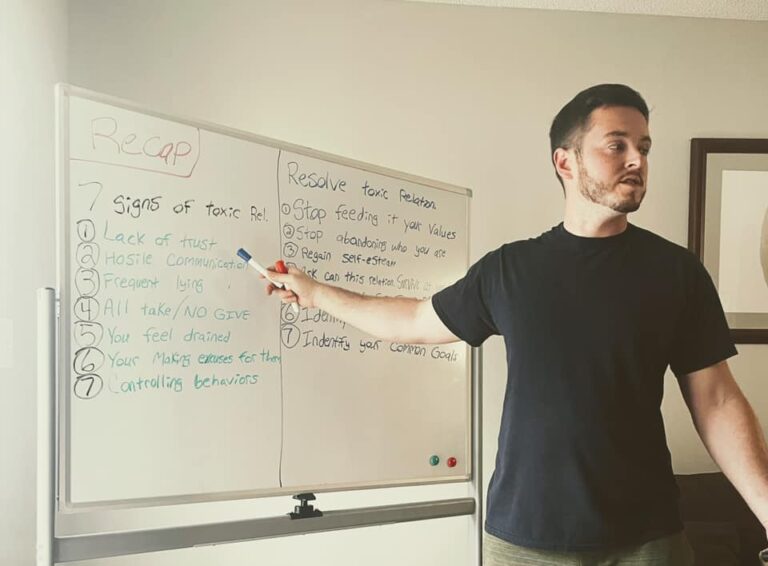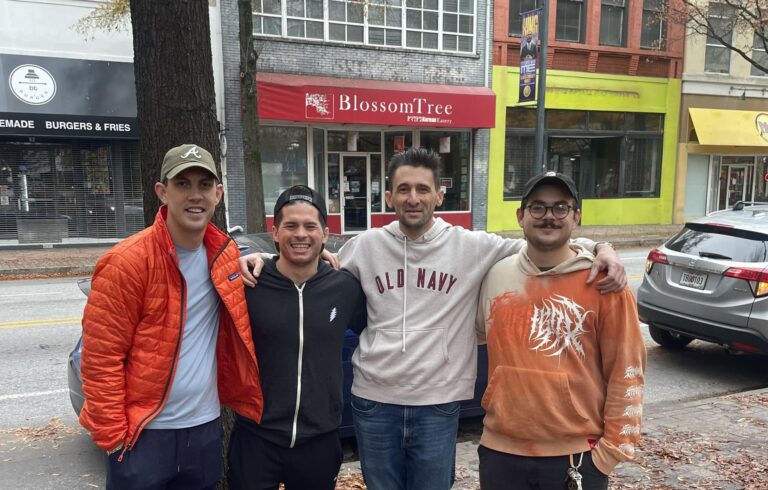Finding Rehab in Marietta, Georgia

How Does Rehab in Marietta Work?
At Four Winds, we work with outpatient rehab programs to combine the independence of sober living homes with the structured support of a Partial Hospitalization Program or Intensive Outpatient Program. We collaborate with esteemed partners in the area to provide a continuum of care that addresses the varied needs of our clients. This synergy allows us to offer a more holistic approach to recovery, encompassing mental health services, substance use treatment, and life skills development. Our goal is not just to treat addiction, but to equip our clients with the means to build a fulfilling, sober life.
These programs offer a comprehensive suite of services aimed at supporting men in overcoming addiction. These services include:
Experiential Therapy
Family Therapy
Psychoeducational Groups
Anger Management
Medication Management
Medication-Assisted Treatment (MAT)
Life Skills Training
Cognitive-Behavioral Therapy (CBT)
Alternatives to 12-Step Programs
How Do I Know I Need Drug & Alcohol Rehab?
Recognizing the need for help is the first step towards recovery. If substance use has become a central aspect of your life, interfering with your relationships, health, and responsibilities, it may be time to seek professional assistance. Signs of addiction can vary widely, but they often include increased tolerance, withdrawal symptoms, and a persistent desire to use despite negative consequences.
Recognizing the signs that you might need rehabilitation for substance use is crucial for getting the help you need.
Common indicators include:
Increased Tolerance: Needing more of the substance to achieve the same effects, indicating physical dependence.
Withdrawal Symptoms: Experiencing physical or psychological withdrawal symptoms when not using the substance, such as anxiety, irritability, shakes, nausea, or headaches.
Loss of Control: Using more of the substance than intended or for a longer period than planned.
Unsuccessful Attempts to Quit: Repeated attempts to reduce or stop using the substance without success.
Excessive Time Spent on Substance Use: Spending a lot of time obtaining, using, or recovering from the effects of the substance.
Neglecting Responsibilities: Failing to fulfill obligations at work, school, or home due to substance use.
Interpersonal Problems: Experiencing frequent conflicts with friends or family members over substance use or becoming isolated from loved ones.
Loss of Interest: Abandoning hobbies, activities, or social gatherings that were once enjoyable, in favor of substance use.
Risky Behaviors: Engaging in dangerous activities while under the influence or to obtain the substance, such as driving drunk or unsafe sex.
Legal Issues: Encountering legal problems due to substance use, like arrests for DUI, disorderly conduct, or possession.
Continued Use Despite Negative Consequences: Persisting in using the substance even when it’s causing health problems, financial strain, or strained relationships.
Mental Health Deterioration: Experiencing worsening symptoms of existing mental health conditions, or the onset of new symptoms, due to substance use.
If you or someone you know is showing these signs, it may be time to consider seeking professional help from a rehab center.
How Do I Know What Level of Treatment I Need?
Determining the appropriate level of treatment is crucial for a successful recovery. The programs we work with conduct thorough over-the-phone assessments to understand each client’s situation and needs. We discuss the differences between PHP, IOP, and Outpatient (OP) programs, helping you make an informed decision about the best path forward.
How Much Does Rehab in Marietta, Georgia Cost?
The cost of rehab can vary based on the program and duration of stay. At Four Winds, we strive to work with programs that offer accessible treatment. We also work with programs that work with major insurance providers and offer various payment options to accommodate our clients’ financial situations. Our team is here to help you navigate the process and ensure you get the support you need.
Begin Rehab in Marietta, Georgia Today
Four Winds is more than just a sober living; it’s a community dedicated to supporting men on their journey to lasting sobriety. If you or a loved one is struggling with addiction, we invite you to learn more about our programs and how we can help. Together, we can overcome addiction and build a brighter, sober future. Contact us today to start your recovery journey in Marietta, GA.






